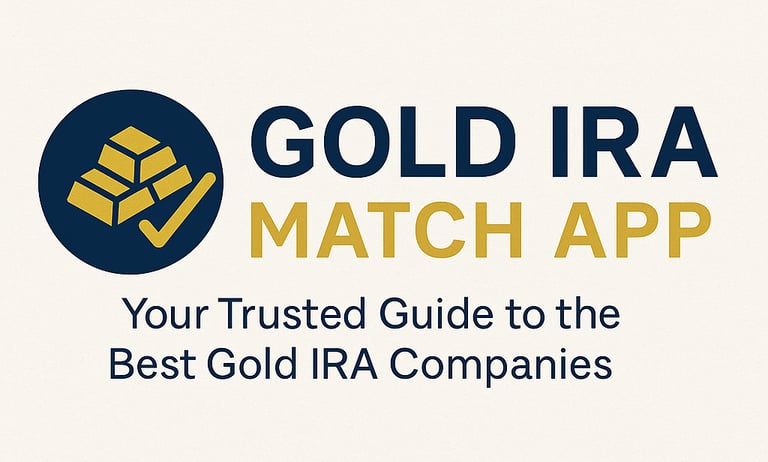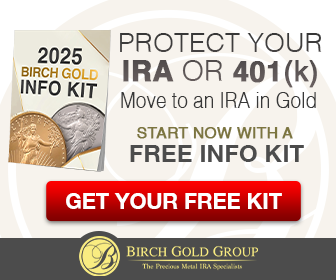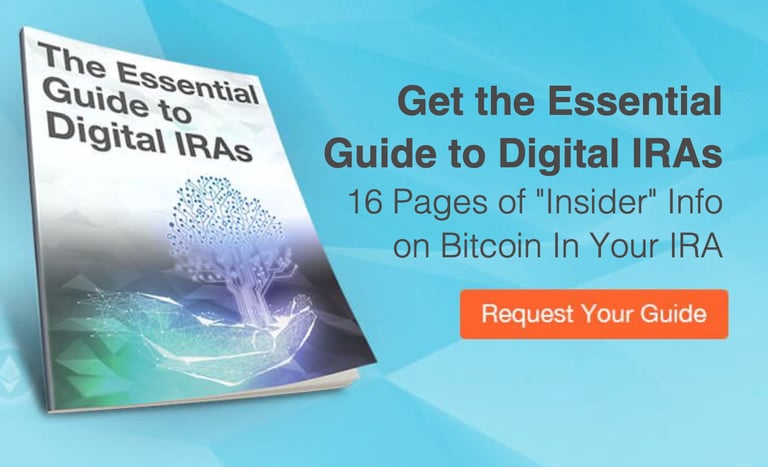How to Start a Gold IRA in 2025: A Beginner's Guide
In an unpredictable economic environment, numerous investors are increasingly turning to alternative assets, with gold being a prominent choice. This article examines the concept of a Gold IRA and its distinctions from traditional IRAs, emphasizing diversification and self-directed IRAs, highlighting its role as a strategic hedge against inflation and market volatility, with potential tax benefits.
We analyze the significant factors contributing to the rising interest in precious metals in 2025 and how they fit into retirement planning and provide a comprehensive step-by-step guide for establishing a Gold IRA, including understanding IRS regulations. Furthermore, we identify reputable companies within the market, like GoldenCrest Metals and Colonial Metals Group, and elucidate critical IRS regulations pertinent to these investments. Explore this article to gain insights into how you can enhance your financial future through the acquisition of gold and other physical assets.
Get the 2025 Guide from GoldenCrest Metals
Learn More
This article may contain affiliate links that earn a commission at no cost to you. Informational only – not financial advice. When considering home storage Gold IRAs, consult your tax or retirement advisor for personalized guidance.
Key Takeaways:
A Gold IRA is a retirement account that allows investors to hold precious metals like gold, silver, and platinum.
In 2025, investors are turning to Gold IRAs as a hedge against inflation and market volatility in the current economic climate.
To start a Gold IRA, investors must choose a custodian, open a self-directed IRA account, fund the account, choose the type of gold to invest in, purchase the gold, and store it in an approved depository.
Looking to roll over a 401k to Gold?
Learn More
Michael Savage's Recommended Gold Company
What Is a Gold IRA?
A Gold IRA, or Gold Individual Retirement Account, is a specialized retirement account that enables investors to hold physical gold and other approved precious metals as part of their retirement strategy. Unlike traditional IRAs, which primarily consist of stocks and bonds, a Gold IRA offers a distinctive investment vehicle centered on tangible assets that have historically retained their value, particularly during economic downturns.
This allocation of assets contributes to the diversification of an investment portfolio and is increasingly acknowledged for its potential to provide tax-deferred gains and facilitate wealth preservation, thereby supporting a secure financial future.
What Makes a Gold IRA Different from a Traditional IRA?
A Gold IRA differs from a traditional IRA primarily in the types of assets permitted; traditional IRAs typically consist of stocks, bonds, and mutual funds, whereas Gold IRAs focus on precious metals such as gold bullion, coins, and other tangible assets. This distinction allows investors to adopt an investment strategy that emphasizes gold allocation as a safeguard against market risk and economic uncertainty.
In examining these two retirement options, several key differences emerge that can significantly influence financial strategies. Traditional IRAs are limited to financial instruments such as stocks and bonds, which restricts diversification and exposes investors to the volatility of market trends. Conversely, Gold IRAs not only permit the inclusion of physical gold but also facilitate a self-directed IRA approach, which provides investors with greater control over their investments. This flexibility enables individuals to diversify their portfolios with precious metals, which often demonstrate strong performance during economic downturns, thereby aiding in mitigating the risks associated with market fluctuations.
Investments: Traditional IRAs -> Financial Instruments.
Investments: Gold IRAs -> Physical Assets.
Risk Management: Gold serves as a hedge against inflation.
In this context, investors can recognize the distinct advantages presented by Gold IRAs, as they strategically position themselves to navigate financial uncertainty more effectively than conventional accounts.
Why Are Investors Turning to Precious Metals in 2025?
In 2025, an increasing number of investors are turning to precious metals, particularly through Gold IRAs, as a strategic response to heightened economic volatility and concerns regarding inflation.
The historical performance of gold as a dependable asset during periods of economic downturns has solidified its reputation as an effective hedge against inflation.
This trend has prompted individuals to consider wealth preservation and the potential for substantial investment opportunities within their retirement planning.
What Is the Current Economic Climate?
The current economic climate is marked by rising inflation and considerable market volatility, prompting investors to seek stable investment opportunities to safeguard their financial future.
As inflation rates continue to surge, the purchasing power of consumers is diminishing, necessitating a reassessment of investment strategies to ensure long-term sustainability. This environment has notably led to increased interest in Gold IRAs, which provide a hedge against inflation and are frequently regarded as a safe haven during periods of economic turbulence. Additionally, fluctuations in interest rates have a significant impact on borrowing costs and market trends, thereby influencing investor behavior.
Market trends indicate a growing demand for precious metals.
Heightened economic uncertainty drives both individual and institutional investors toward tangible assets.
Gold continues to be recognized as a reliable store of value.
These factors collectively suggest a shift in investor behavior, emphasizing a proactive approach to asset protection in this unpredictable economic landscape.
Why Is Gold a Good Hedge Against Inflation and Market Volatility?
Gold is widely recognized as a strong hedge against inflation and market volatility, owing to its intrinsic value and historical performance during periods of economic uncertainty. As inflation diminishes the purchasing power of fiat currencies, gold typically appreciates in value, thereby positioning itself as a preferred asset for wealth preservation and a critical component of a comprehensive investment strategy.
The attraction of gold as a safe-haven asset is derived from its resilience in the face of various economic challenges. Historically, during times of financial distress, such as the 2008 financial crisis, gold has consistently demonstrated the ability to maintain its value when stock markets decline. Investors frequently seek refuge in gold during such periods, resulting in increased demand and rising prices.
Gold's value stability is supported by its limited supply and global acceptance, further reinforcing its esteemed status.
As a tangible asset, gold serves as a counterbalance to the fluctuations of equities and bonds, making it an effective instrument for portfolio diversification.
Central banks commonly acquire gold as a reserve asset, which enhances its credibility as a reliable investment.
In conclusion, incorporating gold into an investment portfolio can significantly enhance overall performance, particularly in turbulent markets, thereby underscoring its essential role in contemporary financial planning.


Step-by-Step Guide to Setting Up a Gold IRA
Establishing a Gold IRA requires adherence to several essential steps to ensure compliance with IRS regulations and to formulate a comprehensive investment strategy centered on precious metals. Investors must first select a qualified custodian for their Gold IRA, proceed to open a self-directed IRA account, and follow designated procedures for funding the account.
Additionally, it is crucial to carefully select the appropriate gold assets for inclusion in the portfolio.
Choose a Custodian for Your Gold IRA
Selecting a reputable custodian is essential for establishing a Gold IRA, as they are tasked with managing the account and ensuring adherence to IRS regulations. Investors should undertake comprehensive research on third-party providers and account administrators, comparing custodian fees and services to identify the most suitable option for their investment objectives.
When evaluating potential custodians, it is imperative to consider several key factors. Foremost, one should seek a custodian with significant experience in managing Gold IRAs, as this ensures familiarity with the specific regulations and requirements involved. It is also crucial to assess their fee structure, as custodians may impose varying charges for account setup, maintenance, and transactions. Transparency regarding these fees can result in substantial savings for investors over time.
Key factors to consider include:
Experience in precious metals
Transparent fee structures
Range of services provided
Quality of customer support
An ideal custodian should offer a comprehensive array of services, encompassing storage options, reporting, and compliance assistance. Ultimately, conducting thorough research will enable investors to make informed decisions that align with their financial objectives.
Open a Self-Directed IRA Account
Opening a self-directed IRA account represents a critical step in establishing a Gold IRA, providing investors with the flexibility to select investment options beyond traditional assets. This account type enables individuals to allocate their funds toward precious metals and other alternative investments, thereby aligning with their financial objectives.
To successfully open a self-directed IRA account, individuals must adhere to a series of systematic steps that ensure compliance and facilitate informed investment decisions.
First, it is essential to select a qualified custodian who specializes in managing self-directed IRAs and possesses expertise in Gold IRAs.
Following the selection of the custodian, investors must gather the necessary documentation, which includes identification, proof of income, and completed application forms. This documentation is vital for the secure establishment of the account.
Evaluate the available investment options to determine the most suitable fit for financial objectives.
Make an initial contribution, being mindful of the annual contribution limits established by the IRS.
Consult with a financial advisor to comprehend the risks associated with precious metal investments.
By utilizing a self-directed IRA, particularly for Gold investments, individuals can attain greater autonomy over their portfolios, which may lead to increased investment returns and enhanced diversification, serving as an effective inflation hedge.
Fund Your Account with Gold IRA Contributions
Funding a Gold IRA represents a critical step that can be accomplished through various methods, including cash transfers and rollovers from existing retirement accounts, such as those managed by Equity Trust Company. Proper contributions to an IRA are essential for maximizing potential tax-deferred gains and establishing a solid foundation for an investment strategy, while also considering average annual growth.
Understanding the nuances of the different funding methods not only enables investors but also provides clarity on effectively navigating these financial avenues. Among the popular options are:
Direct Rollovers: This method is often seamless, requiring minimal involvement from the investor while avoiding tax implications.
Cash Transfers: This option allows for immediate compliance with IRS regulations but may limit the amount of capital that can be transferred at one time.
Indirect Rollovers: While this method may offer flexibility, it necessitates strict adherence to a 60-day window for re-depositing funds to avoid penalties.
When executing these transfers, it is advisable to consult with financial advisors to ensure regulatory compliance and to select the method that best aligns with individual investment objectives.
Choose the Type of Gold to Invest In: Gold Coins or Gold ETFs
Selecting the appropriate type of gold for investment purposes is a critical decision for Gold IRA holders, as the quality and form of the gold, including options like gold ETFs, can significantly influence the overall investment outcome and financial security.
Investors must meticulously evaluate the various options available to them. Gold bullion, often regarded as the purest form of gold, is distinguished by its high purity level and is typically traded in physical forms such as bars and ingots. Gold coins, including the American Gold Eagle, not only possess intrinsic value based on their gold content but also carry numismatic value, which can enhance their market appeal. Conversely, gold bars offer a practical means of storing gold in larger quantities, generally presenting lower premiums over spot prices compared to coins.
When constructing an investment portfolio, it is essential for individuals to assess how each type of gold aligns with their overall financial strategy. Key factors to consider include:
Liquidity: Coins may exhibit superior resale value in the retail market.
Storage: Larger gold bars necessitate secure storage solutions.
Tax implications: Different forms of gold may have varying impacts on tax liabilities.
Understanding these distinctions is vital for making informed decisions that align with personal investment objectives.
Purchase Your Gold
Once the type of gold has been selected, the subsequent step is to acquire the gold through a reputable dealer in the gold market, such as those in Zurich or Dubai, ensuring that all transactions adhere to IRS regulations for Gold IRAs. This process involves selecting a dealer, negotiating prices, and securing the gold holdings.
Identifying a trustworthy dealer is essential, as it ensures not only the authenticity of the gold but also favorable transaction terms.
Begin by researching dealer credentials, including membership in trade organizations and positive customer reviews. It is advisable to compare multiple dealers to guarantee competitive pricing.
When entering negotiations, potential buyers should be prepared to discuss not only the price per ounce but also any premiums associated with the gold. It is crucial to verify the dealer’s compliance with IRS regulations to avoid potential penalties in the future.
Along with making the purchase, individuals should meticulously maintain all transaction records to ensure compliance and safeguard their investment.
Store Your Gold in an Approved Depository for Secure Gold Storage
Storing gold in an approved depository is imperative for Gold IRA account holders, as IRS regulations mandate that gold must be stored in a secure location overseen by custodians. This practice not only ensures the safety of the investment but also maintains compliance with all applicable legal requirements, preventing issues like those during a market crash.
When evaluating potential locations for housing precious metals, it is essential to assess the security measures implemented by an approved depository. Facilities should possess advanced security features, such as:
24/7 surveillance and monitoring
Advanced fire and flood prevention systems
Insurance coverage against theft and loss
A thorough understanding of the custodian's role is fundamental. These professionals facilitate transactions and ensure compliance with IRS regulations, which encompass proper documentation and reporting.
It is crucial to select a depository with a strong reputation and a proven track record of reliability. Verifying that it conforms to regulatory standards can prevent potential complications in the future.
What Companies Offer Gold IRAs and Crypto IRAs?
A diverse range of companies provides Gold IRAs, allowing investors to engage in precious metal investments through reputable firms that specialize in alternative assets.
These investment firms and third-party providers offer a comprehensive suite of services, including account management, as well as the purchasing and storage of gold.
GoldenCrest Metals
Our top recommendation overall for transparency, education, and customer support. Low minimum $10,000 minimum.
Colonial Metals Group
A reputable client-centric company that distinguishes itself though a variety of services for experienced investors as well as newcomers.
Big on client education, Augusta Precious Metals offers "white glove service." Best for larger accounts - minimum investment is $50,000.
Augusta Precious Metals
Birch Gold Group offers a comprehensive range of services from account setup to ongoing support.
Bit IRA is a platform that allows you to put an IRA into Cryptocurrency offering tax advantages
GoldenCrest Metals
GoldenCrest Metals is a prominent investment firm specializing in Gold IRAs, offering a comprehensive range of services designed to assist clients in managing their precious metals investments. The company provides account management, market insights, and competitive pricing to facilitate optimal investment strategies.
With a strong commitment to excellence, GoldenCrest Metals distinguishes itself in the investment sector by prioritizing customer satisfaction and education. Their experienced team excels in developing tailored investment plans that address the unique needs of each client, making the investment process both seamless and informed.
Clients benefit from dedicated account representatives who are readily available to address inquiries and provide timely updates on market trends.
The firm also offers valuable resources, including market analysis reports and investment webinars, equipping investors with the knowledge necessary to make informed decisions.
GoldenCrest Metals places a strong emphasis on transparency, ensuring that clients have a clear understanding of the costs associated with their investments.
By cultivating a supportive environment and leveraging their expertise, GoldenCrest Metals enables investors to confidently diversify their portfolios through the potential of precious metals.
Colonial Metals Group
Colonial Metals Group is recognized for its client-centric approach in managing Gold IRAs, offering investors personalized services and a diverse range of investment options in precious metals. Their expertise in the market enables clients to make well-informed decisions regarding their investments.
By leveraging extensive industry knowledge, this organization distinguishes itself through a variety of tailored services designed for both experienced investors and newcomers. Clients can benefit from:
In-depth market analysis that assists them in navigating the often complex landscape of precious metals investing.
Comprehensive educational resources that enable them to understand the intricacies of Gold IRAs.
Dedicated account management that prioritizes individual needs and preferences.
Their commitment to transparency and integrity has reinforced their reputation within the industry, establishing them as a reliable partner for those seeking to secure their financial futures.
Birch Gold Group
Birch Gold Group is recognized for its dedication to educating investors regarding Gold IRAs, ensuring that they comprehend the complexities of precious metals investment and the most effective strategies for safeguarding their wealth. The firm offers a comprehensive range of services, from account setup to ongoing support.
Along with fundamental account management, this esteemed organization provides an array of resources tailored to investors at every level, rendering their services invaluable for individuals seeking to diversify their portfolios.
Through webinars and informative guides, clients are equipped with essential knowledge.
The firm also conducts personalized consultations, aiding individuals in navigating the complexities of market trends, asset allocation, and economic conditions.
By fostering a collaborative environment, the firm aims not only to secure clients’ investments but also to cultivate a community of informed investors prepared to address the challenges of the financial landscape. Consequently, Birch Gold Group's educational initiatives serve as a crucial resource for those aspiring to make prudent decisions in their wealth management strategies.
Augusta Precious Metals
Augusta Precious Metals stands as a leading entity in the Gold IRA industry, dedicated to providing customized investment solutions while ensuring high levels of customer satisfaction. Their expertise in precious metals serves to assist clients in constructing a secure financial future.
Demonstrating a firm commitment to transparency and trust, the company offers a comprehensive range of services and prioritizes education, thereby enableing investors to make informed decisions. Clients value the personalized approach, as each investment strategy is meticulously tailored to align with individual objectives.
Key features of Augusta Precious Metals include:
Expert consultations with seasoned professionals who possess a deep understanding of market dynamics.
A diverse selection of precious metals, including gold and silver, which facilitates the creation of diversified portfolios.
Streamlined account setup processes that ensure a seamless experience when opening a self-directed IRA for retirement savings.
Ongoing customer support that guarantees prompt responses to any inquiries.
Ultimately, Augusta Precious Metals excels in nurturing long-term relationships, positioning itself as a preferred choice for investors seeking reliability and expertise in asset acquisition.
IRS Rules for Gold IRAs
Understanding the Internal Revenue Service (IRS) regulations pertaining to Gold Individual Retirement Accounts (IRAs), including Crypto IRAs, is essential for investors seeking to ensure compliance and optimize the tax benefits associated with their accounts.
These regulations encompass various critical aspects, including the permissible types of gold, contribution limits, required minimum distributions, and distribution guidelines.
Types of Gold Allowed in a Gold IRA
The Internal Revenue Service (IRS) has established specific guidelines regarding the types of gold that may be included in a Gold Individual Retirement Account (IRA). These guidelines generally encompass gold bullion and certain gold coins while excluding collectibles. Adhering to these regulations is essential for investors to maintain the tax-deferred status of their accounts.
A comprehensive understanding of these nuances is crucial for individuals seeking to optimize their retirement portfolios. The IRS-approved categories of gold can be delineated as follows:
Gold Bullion: This category includes gold bars and rounds that meet a minimum purity requirement of .995, rendering them a favored option for investors.
Gold Coins: Certain coins, such as the American Gold Eagle, American Silver Eagles, and the Canadian Gold Maple Leaf, qualify as they conform to the purity standards specified by the IRS.
Collectibles: Regrettably, items classified as collectibles, including rare coins or historical artifacts, are not eligible for inclusion in a Gold IRA.
Maintaining compliance with these regulations not only protects the investor's tax advantages but also upholds the integrity of their wealth-building strategy.
Contribution Limits
Gold IRAs are subject to annual contribution limits established by the Internal Revenue Service (IRS), which dictate the maximum amount investors may contribute to their accounts each year.
These limits, which vary based on factors such as age and filing status, can significantly impact an investor's decision-making process. For example, the standard contribution limit for IRAs in 2023 is $6,500; however, individuals aged 50 and older are allowed an additional catch-up contribution of $1,000.
Understanding these thresholds is essential, as they may change annually in response to inflation adjustments, thereby influencing the overall growth potential of retirement portfolios. Investors are encouraged to regularly review IRA contribution limits to ensure alignment with their retirement strategies and to maximize tax benefits before the contribution deadline.
Annual Limits: $6,500 for individuals under 50; $7,500 for individuals aged 50 and over.
Potential for changes each year based on IRS adjustments.
Importance of remaining informed for effective planning.
Distribution Rules
Distribution rules for Gold IRAs are governed by IRS regulations, which delineate the conditions under which investors may withdraw funds from their accounts without incurring penalties. These regulations also outline the required minimum distributions (RMDs) that must commence at a specified age.
Understanding these regulations is essential for effective retirement planning, as they ensure compliance while maximizing the benefits of a Gold IRA. Investors should be aware that RMDs typically begin at age 72, necessitating the withdrawal of a specific amount each year based on life expectancy tables.
Failure to comply with these rules can lead to significant consequences, including a substantial penalty of 50% on the amount that should have been withdrawn. While Gold IRAs serve as a strategic hedge against inflation and market volatility, it is crucial to navigate the complexities of distributions for successful asset management.
The following points provide an overview of the critical aspects of these distribution rules, including required minimum distributions:
RMDs are mandatory beginning at age 72.
Withdrawals made before age 59½ may be subject to early withdrawal penalties.
Gold IRAs must adhere to the same distribution rules as traditional IRAs.

Frequently Asked Questions
What is a Gold IRA and why are investors turning to it in 2025?
A Gold IRA, or Individual Retirement Account, is a retirement account that allows individuals to invest in physical gold and other precious metals. In 2025, many investors are turning to Gold IRAs as a hedge against inflation and market volatility, as gold has historically held its value and even increased in times of economic uncertainty.
How does a Gold IRA differ from a traditional IRA?
Unlike a traditional IRA, which typically only allows for investments in stocks, bonds, and mutual funds, a Gold IRA allows for investments in physical gold, silver, platinum, and palladium. This provides investors with a more diverse portfolio and potential protection against market fluctuations.
What are the steps for setting up a Gold IRA?
First, you will need to open a self-directed IRA account with a custodian that offers Gold IRAs. Next, you will need to fund your account either through a rollover from an existing retirement account or through a direct contribution. Then, you can choose which precious metals you want to invest in and make the purchase through a precious metals dealer.
Which companies offer Gold IRAs?
Some reputable companies that offer Gold IRAs include GoldenCrest Metals, Colonial Metals Group, Birch Gold Group, Augusta Precious Metals and Noble Gold Investments. It is important to do your research and choose a company with a good reputation and track record in the precious metals industry.
Are there any IRS rules or restrictions for Gold IRAs?
Yes, there are rules and restrictions that must be followed in order to maintain the tax-deferred status of your Gold IRA. For example, the physical gold must be held by a custodian and cannot be stored at your personal residence. Additionally, there are certain types of gold that are not allowed in a Gold IRA, such as collectible coins.
Can I convert an existing IRA into a Gold IRA?
Yes, you can convert a traditional IRA or Roth IRA into a Gold IRA through a rollover. This allows you to transfer the funds from your existing retirement account into a self-directed IRA that allows for investments in precious metals. It is important to follow the correct procedures and consult with a financial advisor or tax professional to avoid any penalties or taxes.
Invest
Secure
Trustworthy
© 2024 GoldIRARolloverGuide.net. All rights reserved.




















